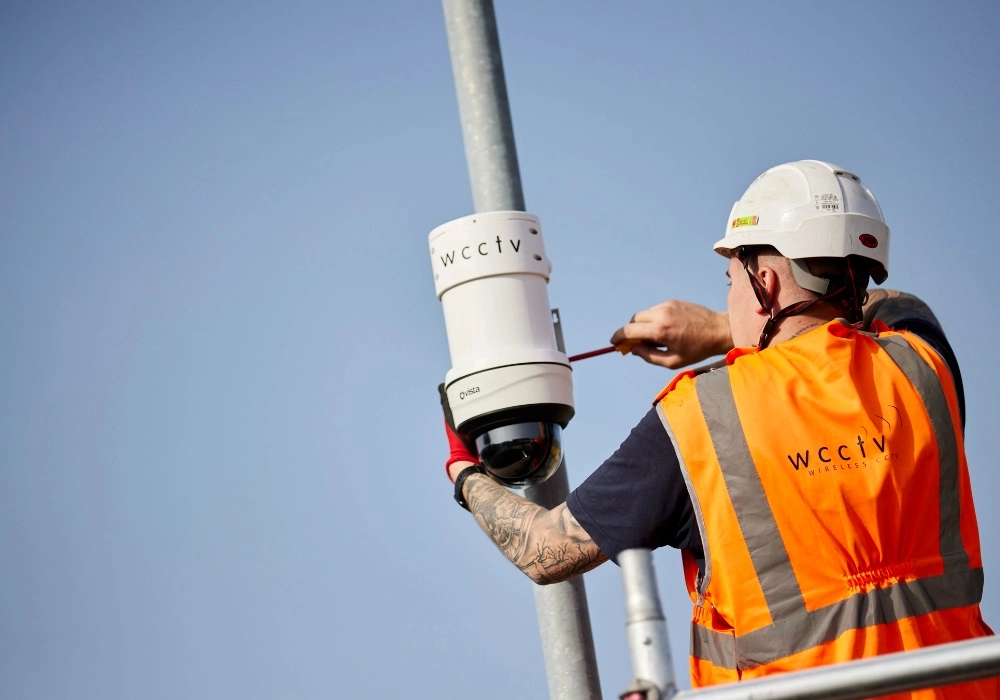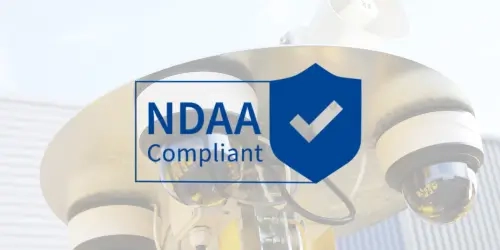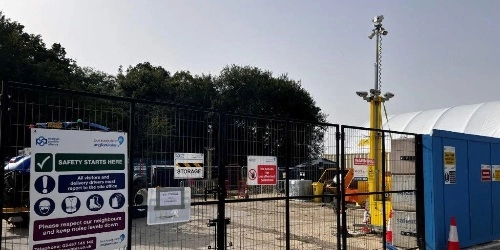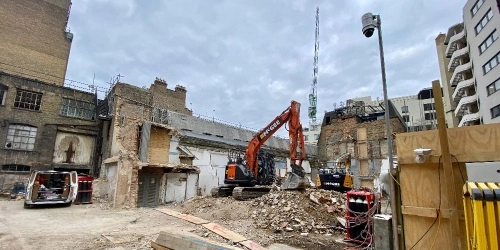Security technology like CCTV cameras and monitoring systems is becoming increasingly common in workplaces, streets and commercial areas.
However, when discussing surveillance, the focus extends beyond what CCTV cameras record to what continuous monitoring prevents. The awareness of being watched, whether actual or perceived, can significantly influence how people act.
In this guide, we explore the psychological implications behind surveillance technology, why visibility matters and how it can influence people's actions, deter crime and help create safer environments.
The Psychology Behind Surveillance: The Panopticon Effect
The psychology of surveillance can be traced back to the Panopticon, a concept introduced by English philosopher Jeremy Bentham in 1785. He designed a circular prison featuring a central watchtower, where a single guard could observe all inmates without them knowing if they were being watched at any particular moment.
The concept focused less on continuous monitoring and more on the perception of constant observation. Since prisoners couldn't tell when they were under observation, they began to behave as if they always were. This led to self-regulation, a psychological shift where the fear of being watched encouraged good behaviour and improved human social interactions.
Years later, French philosopher Michel Foucault expanded on this concept. He argued how modern societies use surveillance technology and the human sensory perception of being observed to encourage conformity and self-discipline. This didn't just apply in prisons, but also in schools, hospitals, workplaces and society at large.
Essentially, the "Panopticon effect" is the heightened awareness of feeling watched, resulting in self-regulation and obedience, even when surveillance is not constant. It explains why visible CCTV Towers and surveillance cameras, such as those on construction sites or in urban areas, can act as strong deterrents even when no one is actively watching.
How Surveillance Psychology Shapes Behaviour
When individuals are increasingly aware of being watched, the psychological impact shapes their behaviour in several ways:
-
Heightened awareness: People become unconsciously more alert and sensitive to social cues, especially eye gaze. This heightened awareness is part of an ancient survival mechanism: the ability to detect another person's gaze. It's a hardwired and involuntary function that has evolved to detect threats.
-
Behavioural changes: Surveillance often encourages people to alter their behaviour to be more socially acceptable. For example, people are generally more giving, less likely to steal or cheat and follow social norms more closely when under observation. Studies have shown that people tend to display prosocial behaviours when they believe they are being watched.
-
Unconscious mental processes: Studies show surveillance not only affects conscious behaviour but also changes how the brain processes information at an unconscious level. This rewiring influences social interactions and mental health, sometimes intensifying feelings of being scrutinised even without overt surveillance.
These psychological responses happen automatically, making visible security measures incredibly effective as part of your security strategy.
Visibility as a Deterrent: Why It Matters
Visibility is one of the strongest psychological tools in your security strategy toolbox. The presence of surveillance cameras can:
- Reduce theft and vandalism: Criminals actively avoid areas with visible constant monitoring.
- Decrease trespassing: The presence of CCTV Towers shows that active security is in place.
- Improve compliance: People tend to follow rules more carefully in monitored areas.
- Enhance community confidence: Visible security creates a sense of safety and order.
Temporary CCTV solutions are particularly beneficial for construction sites, vacant land and temporary locations such as events.
Our Rapid Deployment CCTV Towers can be installed within 20 minutes (basic setups), immediately establishing a physical security perimeter with psychological benefits. The possibility of observation creates a deterrent factor that stops incidents in their tracks.
Additionally, when visible surveillance systems are backed by 24/7 professional monitoring, the psychological impact increases significantly. Criminals understand that trained security professionals at NSI Gold monitoring centres are always watching, assessing potential threats and ready to respond in real-time.
Where Surveillance Psychology Works Best
Here's where fully-managed CCTV systems and surveillance psychology work best:
-
Construction site security: Building sites benefit tremendously from visible deterrence. Our CCTV Towers, standing up to 6 metres tall, create an immediate psychological barrier against theft, vandalism and unauthorised access. They give site managers peace of mind knowing that valuable equipment and materials are protected 24/7.
-
Remote locations: Remote monitoring in isolated areas, like on solar farms or development sites, has psychological benefits that help prevent crime and unwanted access by vandals and squatters. Advanced PTZ (Pan-Tilt-Zoom) cameras equipped with artificial intelligence can detect suspicious behaviour at distances of up to 200 metres in dust, darkness and fog.
-
Commercial and retail settings: Visible monitoring in retail spaces not only deters shoplifting but also gives shoppers a sense of security as they feel safer in monitored environments.
-
Public spaces: Local authorities use visual stimuli to reduce anti-social behaviour (ASB) and other crimes, such as fly-tipping, in the public sector. Our technology is trusted by ASB teams, police forces, housing providers, traffic control and other public bodies to manage public spaces and respond quickly to incidents.
-
Critical infrastructure: Operational facilities (utility providers, rail networks, ports) require both physical security and psychological deterrence. Our professional monitoring systems deliver both: providing 24/7 active protection while sending a clear message to intruders that "this site is watched".
The Security Benefits of Psychological Deterrence
Surveillance offers several practical advantages through its psychological impact:
-
Enhanced sense of security: Visible security measures create an immediate psychological comfort for users. Employees, residents, visitors and business owners feel safer knowing their environment is actively monitored and protected.
-
Reduced anxiety and stress: Knowing that well-implemented security measures are in place provides peace of mind, reducing anxiety and stress.
-
Crime deterrence: People are less likely to engage in anti-social behaviour, vandalism or theft when they know they're being watched. Research suggests that criminal activity was reduced by 13% in areas with CCTV coverage compared to those without.
-
Reduced operational disruptions: The presence of robust security systems significantly reduces downtime caused by theft or damage to critical infrastructure.
-
Insurance benefits: Many insurers recognise the deterrent value of visible surveillance, offering reduced premiums for properties with professional monitoring systems in place.
-
Cost effectiveness: The psychological impact of security measures reduces theft and damage, ultimately saving business owners money on costly repairs and lost revenue. Our CCTV solutions can potentially save you up to 88% on security costs compared to manned guards.
Addressing psychological concerns
Surveillance can lead to feelings of discomfort, heightened anxiety and stress in those being monitored. Research suggests a link between surveillance and mental well-being, with some participants revealing negative consequences such as privacy invasion, surveillance-related stress, psychosis, paranoia and ethical concerns.
However, these concerns are significantly reduced through:
-
Transparency and accountability: Clear communication about when, how and why surveillance is required can help reduce anxiety and mistrust.
-
Privacy regulations: Laws such as the General Data Protection Regulation (GDPR) and the Data Protection Act 2018 give individuals control over their personal information. These legal frameworks help protect privacy, reducing stress linked to the perception of losing this personal freedom.
-
Ethical use guidelines: Organisations using CCTV surveillance are encouraged to follow ethical considerations that prioritise minimal invasion and promote respect for individual rights.
WCCTV balances security and privacy by combining visible, effective surveillance with ethical practices and full regulatory compliance.
Balancing Security and Privacy: WCCTV's Approach
At WCCTV, we're committed to upholding the highest standards of corporate governance, operational excellence and social responsibility through:
Transparency and trust building
Our security installations include:
-
Clear signage indicating monitored areas and why constant monitoring is in place.
-
Defined policies explaining data handling and privacy protection.
-
Compliance standards that meet UK GDPR requirements and industry best practices.
-
Accountability via regular internal/external audits and openly published financial reports.
Our fully-managed service
Our fully-managed service model is designed to provide psychological deterrence and practical protection tailored to your specific needs:
-
Site assessment to determine the appropriate monitoring levels for your specific risks.
-
Professional installation and configuration with minimal disruption to day-to-day operations.
-
24/7 remote monitoring by trained personnel who understand theft detection and response.
-
Mobile keyholding and alarm response for rapid response and incident management.
-
Technical support and reporting throughout your contract period.
At WCCTV, we understand the psychological implications of security and follow strict governance frameworks to ensure compliance. Visit our website for more information relating to our corporate governance policies and procedures.
Transform Your Security with Professional Surveillance
The psychology behind surveillance demonstrates why visibility matters. It's not just about recording incidents but preventing them through proven psychological deterrence.
Our CCTV Towers, remote monitoring services and fully-managed security solutions use this principle to provide 24/7 protection while maintaining ethical standards and industry best practices.
With 6 regional hubs across the UK and over 20-years of experience in wireless CCTV surveillance, we understand how to implement security measures that genuinely work with human psychology.
Ready to discover how professional surveillance can transform your security strategy? Talk to the WCCTV team to discuss your needs today.




